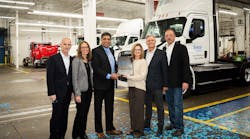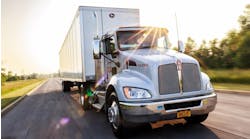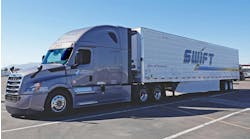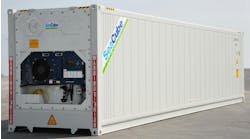Sysco jumps into its electric journey
Sysco Corporation is jumping into the journey to electrification.
The Houston, Texas-based foodservice distributor recently took delivery of its first battery-electric truck, a series-produced Freightliner eCascadia the company plans to deploy in its Riverside, California operation.
Sysco said it will add more eCascadias to its private fleet in coming months.
“The Daimler Truck team has been a great partner to Sysco as we have worked to electrify our fleet and we’re thrilled to receive our first battery-electric Freightliner eCascadia truck, said Marie Robinson, Sysco’s executive vice president and chief supply chain officer, who officially received the Class 8 vehicle. “This zero-emission tractor is powerful, quiet, and—importantly—very comfortable to drive.
“That means it’s not only good for the planet, but it will improve the driving experience for thousands of our delivery partners.”
Earlier this year, Sysco and Daimler Truck North America announced plans to deploy up to 800 eCascadias by 2026. The deployment of the battery-electric trucks, along with electric refrigerated trailers, will play a “significant” role in achieving Sysco’s science-based climate goal, the companies said.
“Sysco is proud to be leading the industry with our science-based climate goal to significantly reduce our direct emissions by 27.5%,” said Neil Russell, Sysco’s senior VP of corporate affairs and chief communications officer. “Today is a major milestone in our climate journey as we work toward electrifying 35% of our U.S. fleet by 2030. Sharing the vision and responsibility with similarly minded companies like Daimler Truck North America is crucial in moving toward a sustainable future.”
Sysco’s Riverside site currently is building out its charging infrastructure to support additional battery electric truck deployments, including adding additional solar capacity, the company reported.
“Thanks to customers like Sysco, we are delivering a purpose-built, zero-emission vehicle to the heavy-duty truck market that offers the durability, reliability, and capability to meet our customers’ business and sustainability goals,” said David Carson, SVP for sales and marketing at DTNA. “The scalability of these trucks and the deep understanding of the integration into fleets will move the industry forward to a cleaner future and make the transformation of transportation a reality.
“The Freightliner eCascadia now rolling off the production line and into customers’ hands represents a historic moment for the entire industry.”
In pre-series production and real-world testing, prototypes of the eCascadia have accumulated more than 1.5 million miles of use in customer fleets since 2018. Revealed in May, the eCascadia debuted the Detroit ePowertrain, in addition to new safety and connectivity features from Detroit Assurance and Detroit Connect.
Powered by multiple battery and drive axle options, the eCascadia provides a typical range of 155, 220, or 230 miles, depending on configuration, the manufacturer said. The truck is well suited for short-haul routes that allow for depot-based charging like last-mile logistics, local and regional distribution, drayage, and warehouse-to-warehouse applications.



